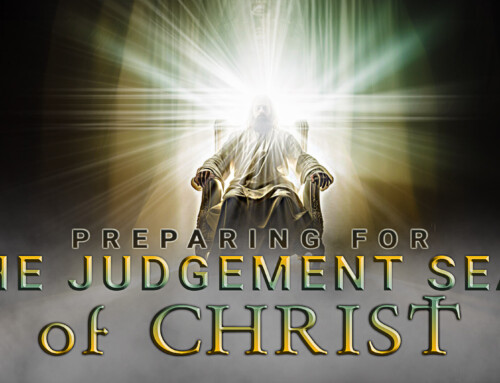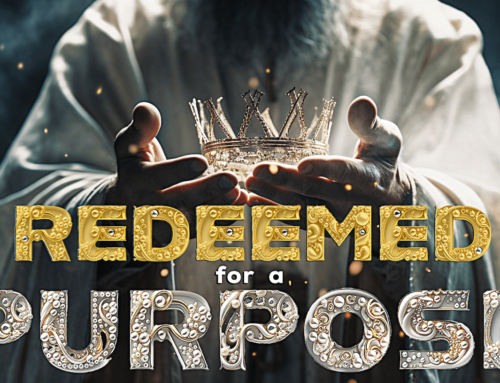HEBREWS 6:9-20
Now in Paul–like fashion, the strong rebuke with warning turns into tenderness and encouragement. “But, beloved, we are persuaded better things (better alternatives) of you, and things that accompany salvation, though we thus speak. For God is not unrighteous to forget your work and labour of love, which ye have shewed toward his name, in that ye have ministered to the saints, and do minister.” [Hebrews 6:9-10] It is easy to see that Paul saw these Hebrews as fellow regenerated Believers, in that their works of sincere love for the brethren were evidence of this, and his calling them the “beloved” shows them his warnings are out of love, not hate.
The peril is real, but these are not religious hypocritical self–deceived people. They were once loving enthusiastic Believers, who had become slothful, in that they had lost confidence, and in being persecuted, they had become discouraged. The encouraging Words of the Father, of being mindful of reward for their efforts, are strong reminders of staying the course. That after the initial work of Christ for eternal life has been received, He is now the perfecter of their ongoing faith and works, and most assuredly is the rewarder of those who diligently seek Him. “…that both he that soweth and he that reapeth may rejoice together…” [John 4:36]
Hebrews 6:11 “And we desire that every one of you do shew the same diligence to the full assurance of hope unto the end: That ye be not slothful, but followers of them who through faith and patience inherit the promises.” The statement is that God is not unrighteous that He has forgotten their labors of love….is this not their “first love” ? But patient faithfulness has great recompense of reward, in that faithfulness requires that love be not abandoned, but continue, and grow until the end of our lives. “And the Lord make you to increase and abound in love….” [1st Thessalonians 3:12]
Love is a commandment of Christ, not just an emotional prompting we are waiting for, but an act of our will. It’s to be habitual. We have not signed a contract, but have entered into Covenant with promises.
What has been set forth by Paul here in the Book of Hebrews is that the eternal Son of God was prophesied in the Old Covenant to be the Savior of Israel and the Gentiles, being the seed of Abraham, to be born of a virgin woman, and become the incarnate Son of God and Son of Man. Whose meritorious life and death brought defeat to satan who had obtained authority over man through the curse of death. Having brought this glory unto the Father, He was the first resurrected from among the dead in newness of life. Becoming the author of a New Creature, He Himself then becoming a life– giving spirit, and gloriously appointed to High Priesthood, and to sit at the right hand of the Father until the time appointed when He should return and receive His Kingdom. By which He had set forth the sure promises of inheritances to His servants, apostles, disciples, and followers who faithfully serve Him as His witnesses and ambassadors in the earth in His stead to Man-kind.
Now to this, Paul took so much care to encourage that not one of these Hebrew laggards be found to fall short of at the Judgment Seat of Christ, specific to His own. Paul was revealing to them the great loss that they were about to incur. That being loss of inheritance into His heavenly kingdom because of lagging behind in slothfulness. He was encouraging them to be diligent “…to the full assurance of (their) hope unto the end…” That is to say, the end of their hope being the reward of the first resurrection in glory. And that in following the examples of those who, in faith and patience grew in the knowledge of God unto good works, had secured the promises or were in the process of inheriting those heavenly kingdom promises. (2nd Peter 1:4-21) In the continuing in that hope, it is essential to be renewing the mind to His Words, and the strengthening in the will of soul in ongoing loving service is also essential. That is exactly what is being reflected in Paul’s walk in Philippians 3:10-14.
So it should be noted that “hope” is the point on which they were being exhorted forward, not their faith. Their “hope” is based upon the faith which they had already expressed and acquired in Jesus Christ’s Blood Atonement work, having been confirmed in the gift of regeneration (John 5:24). And therefore, they are being instructed, that they should in boldness (in full confidence) approach the throne of Grace (Hebrews 4:16) for mercy and grace, that they might maintain that for which they should be in hope for unto the end; “inherit(ing) the promises.” (The promises being the first resurrection and the heavenly kingdom inheritance following). Most Christians have no idea of the 2 parts of the Atonement of Christ; that which has to do with 1) the gift of eternal life and 2) the reward in glory for faithful service; which is their part in it. Most Christians are only “hoping” or thinking of being eternally “saved” from the condemnation of sin. Foolishly, as the unwise virgins, they are resting in being only ½ “saved”, (the first part of the atonement) instead of pressing forward and building on faith’s foundation; that of their assurance of eternal life unto the full assurance of hope of rewards in eternal glory (John 5:24 with 1st Corinthians 3).
The understanding can be enlightened in the two-fold Atonement gospel with the type seen in the contrast or juxtaposition of the Law’s Brazen Altar and Brazen Laver before the entrance of the Holy Place. That being that after the blood sacrifice upon the Brazen Altar was accepted, the priest would then proceed to wash his hands and feet in the Brazen Laver, and that being before he would be able to enter into the Holy Place (here the holy place would be representing the New Covenant throne of Grace in symbolism). So what is in view symbolically in the Law is that our faith is established upon the authenticity and acceptability of Jesus’ Blood as our propitiation offering at the Brazen Altar. And that faith in the first place being substitutionary for Adam’s sin and curse; and having faith in that Blood Sacrifice Atonement; we receive at the “Brazen Altar” once and for all imputed righteousness, in that we may be free of Adam’s curse of condemnation for sin. That translates to deliverance from satan’s kingdom and the receiving of God’s gift of eternal life; in the form of His divine nature. So it should be understood that at the Brazen Altar, we once and forever enter into the New Covenant by justifying faith; and are there subsequently called to be Christ’s servants, witnesses, priests, unto whom He has given promises of inheritance, for reward of service, in His coming kingdom; that is to those Christians judged as worthy overcomers at His return (Revelation 1-3). This is the hope of reward we are to hold until the end, a promised part in His glorious kingdom inheritance (that which the entrance into the Holy of holies holds forth typically).
Now it is here, only after faith has embraced the work of the Brazen Altar, that we are faced with the Brazen Laver. It is there that slothfulness and diligence come into view in the continuing of the pursuit of the full assurance of hope unto the end (something not yet obtained), which is established upon the justification faith (something we have obtained, that work entirely of Jesus Christ in His Righteousness, exclusive to the Brazen Altar). And now, afterwards, the further work deals with our works of righteousness as faith-full servants (mindful of James 2:20 which says that “faith without works is dead”). Our “works” being represented in 1) the Brazen Laver and 2) the “holy place” of communion. Emblematically these two both being symbolically united together in cause, and in readiness for dispensing of cleansing (mercy) and enabling power (grace), as needed, unto those who in the boldness of justification faith in Christ’s “Brazen Altar” Work, patiently and persistently in hope of inheritance, approach the Throne of Grace (Read James 4:1-10).
“I beseech you therefore, brethren, by the mercies of God, that ye present your bodies a living sacrifice, holy, acceptable unto God, which is your reasonable service. And be not conformed to this world: but be ye transformed by the renewing of your mind, that ye may prove what is that good, and acceptable, and perfect, will of God.” [Romans 12:1-2] That is ongoing, cleansing repentance of conscience prompting from double mindedness, (James 1:8, 22-25) looking into the perfect law of liberty, which is the Word of Christ, seen in the exercising of our grateful wills continually; this is the washing of the hands and heart in the Laver. And in bold contriteness, in the full assurance of our standing and calling in justification through faith, we, in purpose draw nigh unto God, going into the “holy place” that we might attain mercy and grace to overcome the temptations, tests, and trials unto the fullness of assurance of our hope. There we may obtain mercy and the enabling grace in obedience by which we may overcome our sinful nature (as opposed to the curse of sin from the Garden) through the divine nature of God within. This maturing in accordance with the ongoing work of the High Priest in the fullness of His 2-part Salvation plan, is represented in type by the Laver and Holy Place. The bringing in of many sons into glory is the object of our hope, the hope of Christ’s promises of heavenly inheritance, that being even into the very Holy of Holies into the Presence of God.
So it is that Paul commends these faltering Hebrew Christians in their past works of righteousness, such as worthy of the calling of hope. They were once diligent, but now are tempted, being slothful, though they had seen what that meant for their ancestors in the wilderness. Now Paul reminds them of the acceptable behavior towards God’s promises. “For when God made promise to Abraham, because he could swear by no greater, he sware by himself (binding Himself to answer to Himself in the breaking, that to say it is unchangeable under any circumstance, this answers to a man’s oath with self-imprecation). Saying, Surely blessing I will bless thee, and multiplying I will multiply thee…” (Genesis 22:17. And so, after he had patiently endured, he obtained the promise.”
What promise did he obtain? He obtained that great irrevocable promise with the Oath, and that being obtained only after patient endurance, even unto this his last and greatest of these 10 trials; the obedient willingness of offering his own son up to death. And what was the promise forthcoming? “…I will bless thee (1st promise), and (2nd promise…) in multiplying I will multiply thy seed as the stars of the heaven (the seed of the heavenly realm of inheritance), and as the sand which is upon the sea shore (the seed of the earthly realm of inheritance); and thy seed (Christ) shall posses the gate of his enemies; And in thy seed (Christ being THE Singular Seed…“Before Abraham was born, I am”… then the two seeds, those as numerous as the stars, are resurrected, shining brilliantly in their heavenly abode {Galatians 33:16} and as the sand; the earthly seed of Abraham) shall all the nations of the earth be blessed; because thou hast obeyed my voice. (Genesis 22:15-18).
What had he endured with patience? A long time lapsed between Abraham’s calling out of Ur and the securing of the last promise. Fifty years he wandered without ever possessing even a foot of what God promised him when he was first justified by faith (Genesis 15) until he was at the last justified by works (Genesis 22), where He gave up is only son, and received back the promise of innumerable seed, both of his flesh and of his faith. None of his promises yet has he realized, although they have advanced marvelously in Christ’s Birth, Death and Resurrection, for all is reserved until the first resurrection. Some would say he has received his reward now in Heaven, but this is to stand in error with Hymenaeus…”But shun profane and vain babblings: for they will increase unto more ungodliness. And their word will eat as doth a canker: of whom is Hymenaeus and Philetus; Who concerning the truth have erred, saying that the resurrection is past already; and overthrow the faith of some.” [2nd Timothy 2:18]
Abraham is the heir of the World (Romans 4:13) and that through his seed. This is typically portrayed in Abraham’s history, in that he had two wives, and a son by each; with distinct inheritances; the centre being Jerusalem, one above and one below (Galatians 4). Both parts of his Singular Seed, Jesus’ Kingdom, of which we (they) are, sealed in Abraham’s promises with God’s Oath; that being with very strong consolation in that He cannot lie, and so Abraham shall see with his very own eyes the blessed and multiplied, which is only possible after his resurrection. That is when he shall also see the promised complete victory of His Seed the Messiah over His enemies, the blessings of the Gentiles and the multiplication of his earthly and heavenly seed, and God’s Redemption Rest, the Millennial Kingdom of Christ.
Thus Abraham is set in contrast to those of his seed/Seed who will be disinherited and closed out of His promises. Unto the one seed whose behavior was most commendable, having faith, patient endurance in hope, and attained his promise of inheritance secured by oath in the eternity of God-Himself, which assures of entry into the Millennial Kingdom of Christ, and to the other of his seed, who in cowardly disbelief refuse to trust His promises and proceed unto His Rest, His oath assures of being locked out.
Hebrews 6:18–20… “That by two immutable things, in which it was impossible for God to lie, we (his seed intrinsically woven into the irrevocable promise) might have a strong consolation (the highest assuring comfort for our participation to offset the great opposition), who have fled for refuge (an allusion to Numbers 35 which is the type for the Body of Christ, Acts 2:40) to lay hold upon the hope (as the horns of the Altar, 1st Kings 1:50) set before us (in Scripture example): which hope we have as an anchor (like that of a ship) of the soul, both sure and steadfast (without possibility of giving way or breaking) and which entereth into that within the veil (the securing line of which extends into the Holiest Place into the very presence of God); Whither the forerunner is for us entered (the surety of our hope of inheritance in the first resurrection for all that is given up in this world in the hope of the next), even Jesus, made an high priest (to bring us also within the veil in due course, that is if the physical seed was to suffer 400 years, then his spiritual seed must suffer more and longer even unto 2000 years, Acts 14:22) forever after the order of Melchizedek.” He has entered in behind the veil as High Priest for His “brethren”. He shall come out as King, in the fixed time of the “7th Day” to remove is enemies from His Kingdom, and reward His “brethren” in Redemption’s Rest. Reward not only the heavenly seed, but the earthly seed as well, as seen clearly in the type of Joseph, “God did send me before you to preserve life.” After his suffering humiliation, he was exalted to the right hand of him upon the throne, who afterwards finally revealed himself to them, after he had revealed their true selves unto them (Genesis 44&45 with Zechariah 12&13). So the argument continues, Paul being intent upon turning the Hebrew Christians back unto the hope of their faith. That they might not suffer the loss of their Millennial Kingdom inheritance.




Leave A Comment